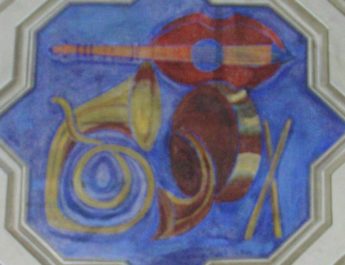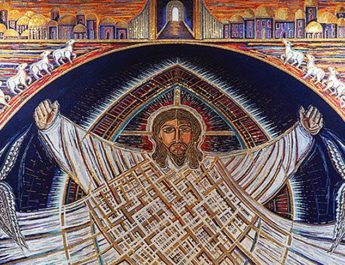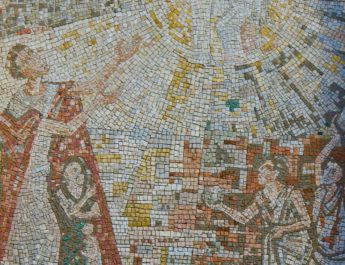Isaiah 40:21-31
Ordinary B11
21 Have you not known?A Have you not heard?B
Has it not been toldC you from the beginning?D
A “known” = yada. This is to know, acknowledge, advise, answer, be aware, be acquainted with. Properly, this is to figure something out by seeing. It includes ideas of observation, recognition, and care about something. It can be used causatively for instruction, designation, and punishment.
B “heard” = shama. This is to hear, call, consent, or consider. It implies listening intelligently, giving attention, and, because of these two factors, obedience and action are often implied.
C “told” = nagad. This is to declare, make conspicuous, stand in front, manifest, predict, explain.
D “beginning” = rosh. This may come a word that means to shake. It is the head, captain, or chief. It can also be excellent or the forefront. It can be first in position or in statue or in time (i.e. the beginning).
Have you not understoodE from the foundationsF of the earth?G
E “understood” = bin. This is to discern, consider, attend to. It refers to distinguishing things in one’s mind or, more generally, to understand.
F “foundations” = mosadah. 11x in OT. From mosad (foundation); from yasad (to establish, appoint, instruct; to set in a literal or figurative sense; also, to sit down together and so to consult or take counsel). This is a foundation.
G “earth” = erets. Root may mean to be firm. This is earth, ground, field land, or country.
22 It is he who sitsH above the circleI of the earth,
and its inhabitantsJ are like grasshoppers;K
H “sits” = yashab. This is to sit and so to remain and so to dwell. It is sitting for any reason – as a judge, in order to ambush, or just sitting quietly. Causatively, this can mean settling or marrying. This can also mean continue, endure, or establish.
I “circle” = chug. 3x in OT – all in reference to the dome of heaven or circle on the deep. From chug (to make a circle, compass, draw around). This is a circle or horizon.
J “inhabitants” = yashab. Same as “sits” in v22. See note H above.
K “grasshoppers” = chagab. 5x in OT. This is locust or grasshopper.
who stretches outL the heavensM like a curtain,N
and spreadsO them like a tentP to liveQ in;
L “stretches out” = natah. This is to stretch or spread out, to extend, or bend. In can also imply moral deflection.
M “heavens” = shamayim. Root may mean being lofty. This is sky, the air, or heaven. It is in a dual noun form so this might refer to the part of the sky where the clouds move on the one hand and the part beyond that where the sun, moon, and stars are on the other hand.
N “curtain” = doq. 1x in OT. From daqaq (to crush, crumble, make dust, be very small). This is a veil or curtain – a very thin cloth.
O “spreads” = mathach. 1x in OT. This is to spread or stretch.
P “tent” = ohel. Perhaps from ahal (to shine, be clear). This is a tent, covering, home, or side pillar.
Q “live” = yashab. Same as “sits” in v22. See note H above.
23 who brings princesR to naught,
and makes the rulersS of the earth as nothing.T
R “princes” = razan. 6x in OT. This is to be heavy or weighty. Figuratively, it is to be honorable or commanding and thus can mean a ruler or prince.
S “rulers” = shaphat. This is to judge, defend, pronounce judgment, condemn, or govern. It can refer to God judging or to human judges. This is pronouncing a verdict in favor or against so it implies consequences or punishment. It can also mean to litigate or govern as one with authority.
T “nothing” = tohu. Root may mean a wasteland or desert. This is desolation or waste. Figuratively, it refers to emptiness, chaos, confusion, futility, something worthless or meaningless, or unreality. Used as an adverb, it can mean in vain. This describes the earth as a “formless void” in Gen 1:2.
24 Scarcely are they planted,U scarcely sown,V
scarcely has their stemW taken rootX in the earth,
U “planted” = nata. To fix or fasten, establish or plant. This is planting in a literal or figurative sense.
V “sown” = zara. This is to sow or scatter seed, conceive or yield. It can also refer to a sower. Figuratively, this can refer to other forms of dissemination.
W “stem” = geza. 3x in OT. This is stem, trunk, stump.
X “taken root” = sharash. 8x in OT. From shoresh (a root, depth, line, heel, bottom; root in a literal or figurative sense). This is to root into soil or uproot.
when he blowsY upon them, and they wither,Z
and the tempestAA carries them offBB like stubble.CC
Y “blows” = nashaph. 2x in OT. This is to blow like a breeze of fresh wind.
Z “wither” = yabesh. This is to be dry, withered, confused, or ashamed. It can also be to fail.
AA “tempest” = sa’ar. From sa’ar (to storm, scattered by a storm, blow away, rage, storm tossed; this is to toss in a literal or figurative sense). This is a storm or whirlwind. It can also be stormy.
BB “carries…off” = nasa. This to lift in a broad sense, literally and figuratively. So it could be to carry, take, or arise. It could also be bring forth, advance, accept.
CC “stubble” = qash. 16x in OT. Perhaps from qashah (this is to gather stubble or forage for it, to gather, straw or wood; figuratively, to gather people, assemble). This is dry straw, chaff, stubble.
25 To whom then will you compareDD me,
or who is my equal?EE says the Holy One.FF
DD “compare” = damah. This is to be like, resemble, devise. It can be to think using analogies.
EE “is…equal” = shavah. This is to equalize, resemble, agree with, compare, adjust, compose, place, or yield.
FF “Holy One” = qadosh. From qodesh (set apart and so sacred; God is different from us and so God is holy/set apart; things we dedicate to God’s service are set apart for God and so they, too, are holy); related to qadash (set apart, consecrated, hallowed, sanctified; something or someone set apart for a holy purpose or use – ceremonially or morally clean). This is sacred or holy in a ritual or moral sense. As a noun, it refers to a holy one (like a saint or angel), a holy place (the sanctuary), or God (the Holy One).
26 Lift upGG your eyesHH on highII and see:JJ
Who createdKK these?
GG “lift up” = nasa. Same as “carries…off” in v24. See note BB above.
HH “eyes” = ayin. This is eye in a literal or figurative sense so eye, appearance, favor, or a fountain (the eye of the landscape).
II “on high” = marom. From rum (to be high, rise, exalted, become proud, display, offer, present, set apart, extol; to rise in a literal or figurative sense). This can be height, high place, or lofty. It can be either exalted or haughty/proud. It can refer to dignity or to heaven.
JJ “see” = raah. This is to see in a literal or figurative sense so stare, advise, think, view.
KK “created” = bara. This is to create, shape, choose, or select. It is the word used in Genesis 1:1 when God created the heavens and the earth.
He who brings out their hostLL and numbersMM them,
callingNN them all by name;OO
LL “host” = tsaba. From tsaba (to wage war, serve, assemble, fight, perform, muster, wait on). This is a large group of persons (used figuratively for a group of things). It implies a campaign literally as with army, war, warfare, battle, company, soldiers. Can also be used figuratively for hardship or for worship.
MM “numbers” = mispar. From the same as sepher (writing itself or something that is written like a document, book, letter, evidence, bill, scroll, or register); from saphar (to tally or record something; to enumerate, recount, number, celebrate, or declare). This is a number, whether definite or symbolic – could be innumerable, few, abundance. It can also be a tally or account – or a narration.
NN “calling” = qara. This is to call or call out – to call someone by name. Also used more broadly for calling forth.
OO “name” = shem. May be from sum (to put, place, set). This is name, fame, renown. A name was thought to indicate something essential about a person – something about their individuality. So, this word can also mean honor, authority, or character.
because he is greatPP in strength,QQ
mightyRR in power,SS
not oneTT is missing.UU
PP “great” = rob. From rabab (to be or become much or many, multiply). This is any kind of abundance.
QQ “strength” = on. 12x in OT. Perhaps from aven (root may mean panting as one does when expending a lot of energy, especially when it comes to nothing; nothingness, trouble, sorrow, distress, wickedness, evil, harm, sorrow, misfortune, and mischief.; used specifically to refer to idols). This is strength, power, ability, wealth, substance, or vigor.
RR “mighty” = ammits. 6x in OT. From amets (to be strong, stout, alert, or bold; to harden, make firm, be courageous or mighty, fortify, or establish; physical alertness or mental courage or steadfastness). This is strength, mighty, courageous.
SS “power” = koach. Root may mean to be firm. This is power, strength, force. It can be literal or figurative, positive or negative. It can also mean capacity or means – what something produces. Additionally, it could refer to some kind of small reptile.
TT “one” = ish. Perhaps from enosh (human, humankind, mortal); from anash (to be weak, sick, or frail). This is man, husband, another, or humankind.
UU “is missing” = adar. 10x in OT. This is to dig, help, keep rank. Properly, it is to muster troops as for battle. So, it could be to miss or lack since you can see who is missing following muster. Also, to arrange like a vineyard and so to hoe.
27 Why do you say, O Jacob,VV
and speak,WW O Israel,XX
VV “Jacob” = Yaakob. From the same as aqeb (heel, hind part, hoof, rear guard of an army, one who lies in wait, usurper). This is Isaac’s son and his descendants. The name means heel-catcher or supplanter.
WW “speak” = dabar. This is generally to speak, answer, declare, or command. It might mean to arrange and so to speak in a figurative sense as arranging words.
XX “Israel” = Yisrael. From sarah (to persist, exert oneself, contend, persevere, wrestle, prevail) + el (God or god). This is God strives or one who strives with God; new name for Jacob and for his offspring. This refers to the people and to the land.
“My wayYY is hiddenZZ from the Lord,AAA
and my rightBBB is disregardedCCC by my God”?DDD
YY “way” = derek. From darak (to tread, march, to walk. Can also mean affixing a string to a box since one needs to step on it to bend it in the process; so also an archer). This is a road as a thing that is walked on. Can be used figuratively for the path that one’s life takes or how one chooses to live one’s life.
ZZ “is hidden” = sathar. This is hide, conceal, or be absent. It is hiding because something is covered – used in a literal or figurative sense.
AAA “Lord” = YHVH. From havah (to be, become) or hayah (to come to pass, become, be). This is the name of the God of Israel, the self-existent and eternal one, the tetragrammaton. This pronunciation has been lost to time so “Lord” is generally used in its place.
BBB “right” = mishpat. Related to “rulers” in v23. From shaphat (see note S above). This is a verdict or formal sentence whether from humans or from God. It includes the act of judging as well as the place that judging takes place, the suit itself, and the penalty. Abstractly, this is justice, which includes the rights of the participants.
CCC “disregarded” = abar. This is to pass over or cross over. It is used for transitions, whether literal or figurative. It can also mean to escape, alienate, or fail. This is the root verb from which “Hebrew” is drawn.
DDD “God” = Elohim.
28 Have you not known? Have you not heard?
The Lord is the everlastingEEE God,
the Creator of the endsFFF of the earth.
He does not faintGGG or grow weary;HHH
his understandingIII is unsearchable.JJJ
EEE “everlasting” = olam. This is a long scope of time whether in the past (antiquity, ancient time) or in the future (eternal, everlasting).
FFF “ends” = qatsah. From qatseh (end, brink, border, edge, frontier; that which is within set boundaries); from qatsah (to cut off, cut short; figuratively, to destroy). This is an end, corner, outer limit, coast, corner, fringe.
GGG “faint” = yaeph. 10x in OT. This is becoming tired or exhausted as following flight. It can also mean to faint.
HHH “grow weary” = yaga. This is to work, become weary, to gasp or be exhausted, to toil.
III “understanding” = tebunah. Related to “understood” in v21. From bin (see note E above).
JJJ “unsearchable” = ayin + cheqer. Cheqer is 12x in OT. From chaqar (properly, to penetrate; to thoroughly investigate, examine, ponder, or seek out). This is a searching, examination, depth, or deliberation.
29 He gives power to the faint,KKK
and strengthensLLL the powerless.MMM
KKK “faint” = yaeph. 3x in OT. From yaeph (see note GGG above). This is weary, exhausted, faint.
LLL “strengthens” = otsmah + rabah. Otsmah is 3x in OT. From otsem (bones, frame, power, strength, substance); from atsam (vast, numerous, strong; to close one’s eyes, to make powerful; to break bones). This is might, strength, abundance. Rabah is increasing in any aspect whether quantity, authority, size, quality, greatness, etc.
MMM “powerless” = ayin + on. On is the same as “strength” in v26. See note QQ above.
30 Even youthsNNN will faint and be weary,
and the youngOOO will fall exhausted;PPP
NNN “youths” = naar. Perhaps from na’ar (to shake, toss up and down, tumble around). This is a child or a servant. It is a child in their active years so they could be aged anywhere from infancy to adolescence.
OOO “young” = bachur. From bachar (to choose, appoint, try, excellent). This is choice, chosen, selected. It is a youth or young man
PPP “fall exhausted” = kashal + kashal. This is to stumble, fail, be weak or decayed, be overthrown, to totter. It can refer to weak legs or ankles so it is falter, faint, or fall. The word is repeated twice – the first time as an Infinitive Absolute. The Infinitive Absolute serves to emphasize the sentiment of the word. It is rather like Foghorn Leghorn’s speech pattern, “I said, I said.”
31 but those who waitQQQ for the Lord shall renewRRR their strength,SSS
QQQ “wait” = qavah. It can mean to bind or gather together, especially in the sense of twisting together. In that light, it can mean collect. Figuratively, this can mean to wait, await, expect, or tarry.
RRR “renew” = chalaph. This is to slide by or rush like a flood. It can mean to pass through, change, sprout, renew, break a promise, pierce, or violate.
SSS “strength” = koach. Same as “power” in v26. See note SS above.
they shall mount upTTT with wingsUUU like eagles,VVV
they shall runWWW and not be weary,
they shall walkXXX and not faint.
TTT “mount up” = alah. This is to go up, approach, ascend, be high, be a priority; to arise in a literal or figurative sense.
UUU “wings” = eber. 3x in OT. From the same as abar (to fly, soar). This is pinion or wing.
VVV “eagles” = nesher. This is an eagle or vulture – some kind of large bird of prey. Its root may mean lacerate.
WWW “run” = ruts. This is to run or rush, divide quickly, bring swiftly. It can also refer to a footman or guard.
XXX “walk” = halak. This is go, come, walk. It is walk literally and figuratively and includes people and animals. It can be used figuratively for one’s moral life – how we walk according to God’s way or against it. It can also refer to the walk of life as in the course one’s life takes, the choices we make, etc.
Image credit: “Bonelli’s eagle in flight” by Dharani Prakash, 2013.




